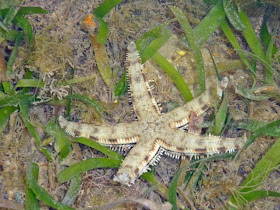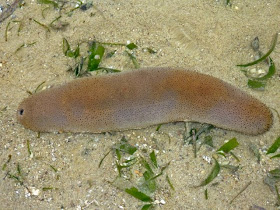
We were shorthanded so each of us has to do a single transect by ourselves. Nevertheless, all of us got the monitoring done, which is great. Here's Jocelyne working hard on her transect. It's hers and Kah Ming's first time to Cyrene as well.
As were were bit delayed today, so the trip was quite a short one. Nevertheless, I managed to have a quick look after completing the transect work and GPS recordings.

The seagrasses support a wide variety of living creatures including this black coloured Cushion star (Culcita novaeguinea).

The underside is very pretty in red. Cushion stars are always a delight and joy to find on our shores. Unfortunately, they are not very common.

Here's a closeup of the top side of the cushion star. Did you notice a small commensal on the aboral surface?

Yup, the commensal is this amphipod-looking creature that is really quite small. It seems to be sticking quite close to the star.

Another species of sea star on the seagrasses will be this juvenile Common sea star (Archaster typicus).

Once again, Cyrene is the heaven for the numerous Knobbly sea stars (Protoreaster nodosus)! Can you spot all five stars in this photo? No where else in Singapore, to our knowledge, can we find so many knobbly sea stars in a given area.

Also among the seagrass is this Haddon's carpet anemone (Stichodactyla haddoni).

Living on the carpet anemone is this Five-spot anemone shrimp (Periclimines brevicarpalis). Why are they on the anemone? They are believed to shelter in the anemone for protection and may feed on leftovers.

Here's another view of the same shrimp from its front.

Three Blue dragon (Pteraeolidia ianthina) nudibranchs were spotted also on the seagrass meadow. Here's two of them.

Just like our previous trip here, the Ornate leaf slug (Elysia ornata) are still in season and we saw many of them! They are believed to eat the Hairy green seaweed (Bryopsis sp.) which they are feeding on in this photo.

I found several of these Hammer oysters (Malleus sp.). Though named as oysters, they are not true oysters.
The two-part shell is thick and T-shaped. The hinge is on the 'horizontal' portion of the 'T' as shown here and the valves held shut by one large adductor muscle that lies at the cross of the 'T'.

Among the sea cucumbers found, there were two uncommon ones. One of which is this unidentified species. It was last spotted last year May at Cyrene as well.

Here's the underside of this sea cucumber. It is rather amazing that it can turn over to the upright position in a few seconds!

I think the top find of the day will be this sea cucumber which is my first time seeing this species.
According to Dr Lane's "A Guide to Sea Stars and Other Echinoderms of Singapore", it is possibly Bohadschia vitiensis. According to him, it tends to hide in the sand during the day and only comes out at dusk. Apparently, it is among the sea cucumbers harvested for food.

It ejects sticky defensive tubules (called Cuvierian tubules) from its backside when it is disturbed. This sea cucumber ejected defensive tubules when I tried to turn it around to look at its underside. Was shocked that it was so sensitive!

It was nice to find the Long-spined black sea urchin (Diadema sp.). It feeds on seaweed, grazing these from dead corals or rubble areas. It may also trap tiny suspended food particles with its long spines, transferring these to the mouth with tube feet.

There is bulbous sac in the middle of the upperside. This is the anal cone. There is often an orange ring around this anal cone. Also we can see five bright white spots on its body.

Question of the day: What has this Thunder crab (Myomenippe hardwickii) done to the Fan clam (Family Pinnidae)?

Thank God we had a lovely sunset to accompany us towards the end of the trip.

As the sun sets with the tide slowly rising back into position, it was time to say goodbye to this magical land full of stars. :-)
No comments:
Post a Comment